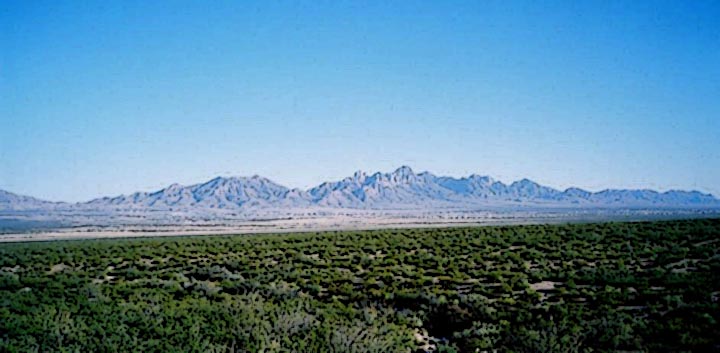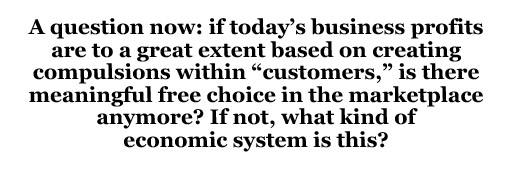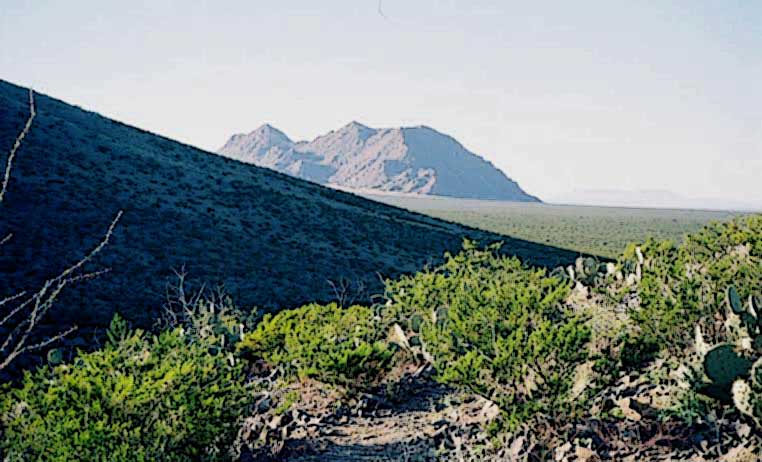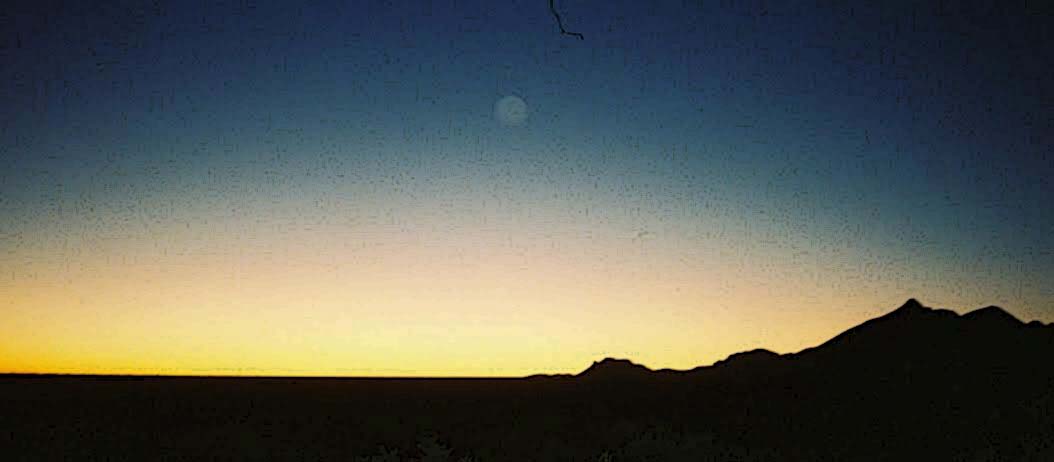“It is common among my people to hear someone say they are the land and the land is them…While human interactions are important, they are not held above the interactions that take place in the natural environment.” – Lisa Grayshield, Washo Tribe
I’m not sure how accurate, much less complete, the following hypothesis is. I hope it will at least be interesting. If I’m lucky, it will stir things up.
As a people, we Americans are systematically destroying the wildness of our Western lands, and the twin axioms of economic expansion and population growth are behind it all. Liberal environmentalism, which many of us had hoped would halt the devastation, has in the end fomented a new means of destruction: recreational tourism, which Jim Stiles has aptly termed Disneyfication.
Now we have two monsters thudding around and devouring the land instead of one; the elder being good ol’ mining and petroleum.
As a long-time drug and alcohol counselor, the way this process is going reminds me of a bit of folklore from Alcoholics Anonymous: “Insanity is doing the same thing over again hoping for a different result.”
Maybe as a culture we have it all backwards. We assume that a hyper-growth economy that gives people what they desire – we should say what it can cause them to desire – will ipso facto result in maximal human contentment and happiness. But what if it’s actually the other way around? Instead of making the economic system the first link in the chain, maybe we should look at what kind of human focusing leads to both contentment AND eco-systemic health and sustainability. And then build our economic system around that.
I admit this sounds idealistic, but wouldn’t it be something if such an economy proved to be both viable and durable?
So then: where to find such focusing? The key point in answering this question is that the human brain evolved and developed its most essential capabilities, including the subtle ones, in hunter-gatherer societies; not in civilized settings. Therefore I think it’s a fair hypothesis that human contentment in its most basic sense also developed in the world of hunter-gatherers.
Of course making such a claim is an affront to our core belief that civilized life is inherently superior. And while I easily concede that many aspects of it are excellent, when it comes to such a vital thing as human contentment, there’s good reason to question what we have going now.
In fact, the reasons for doing so are obvious. Hunter-gatherers traveled around in bands of 100-200, and so the people you lived with knew you inside-out. Probably in your lifetime you seldom if ever had to deal with strangers. The trust that grows out of such conditions has to be incredibly deep. And we have reams of social science research showing that close, trusting relationships and human gratification are intimately linked. Sadly, finding these very relationships in civilized societies is a tenuous process.
Also: hunter-gatherers were suffused by wild country. We are naïve if we assume that under such circumstances the human brain didn’t also develop intricate and subtle relationships with such landscapes, and that these relationships were both a primary source of human fulfillment as well as a means of survival. And tragically we the civilized have, for the most part, lost those connections. Today there is just enough wildness remaining in the lands of the American West, much diminished in recent decades unfortunately, to glimpse what this could mean. If we’re willing to make an effort.
***
I realize that readers of The Canyon Country Zephyr are unlikely to need the following basics on experiencing solitude, i.e., the wildness of the land. In fact, I assume you know them well. But I’m spelling them our anyway because by far most people in our culture do not.
The experience of solitude is the fruit of a contemplative process that on the face of it seems oddly simple. The basic question is this: can you walk out by yourself into the middle of a lot of land that hasn’t lost its wildness, with no cell phone or other tech devices, and sit still for a long, long time, soaking in the vastness and the silence? And gazing into the distance?
This isn’t the only way to experience solitude but it’s the simplest way to start. And with contemplation, simpler is better.
You have to be in a place that has a sacred feel to it. An example: I took the following photograph, a plain distance view of the Organ Mountains, near the bottom of a hill at Chihuahuan Desert Nature Park, about seven miles north of the outskirts of Las Cruces, New Mexico. Seeking solitude there was plausible for two reasons. First, although the park itself is small it’s surrounded by large stretches of open desert land, and second, during the five hours I was there virtually nobody else was.
The experience of solitude involves a subtle feeling of relaxation during which the veil of separation between you and the landscape and all that grows upon it and lives in it thins. As it does there is a bright sense of connection with everything that is intensely personal. Afterward, meaningful insights and reflections, sometimes uncomfortable ones, are likely.
Of course this may not happen right away. It could take some time and repetition. Perhaps a lot of time and repetition.
That’s how the contemplative process works.
***
Intimate, trusting relationships both with people and wild landscapes reveal that the capacity of the brain’s reward system to achieve a marvelously subtle balance – relaxation intertwined with insight – was present long before civilization reared its head.
The human brain is contemplative from way back.
As a counselor I do everything I can to develop a relationship of this kind with the people with whom I’m working, because research validates that not only is it as effective as pharmaceutical medications, it has longer lasting positive effects. I see the process of counseling as a partial effort to redeem the kind of human bonds civilizations have sundered.
That said, let’s look at a different brand of focusing: hypnosis, which I’ve also done a fair amount of in my work. By comparison it provides a more overt state of relaxation as well as a capacity to focus intensely on an experience, an activity, or a goal. But this comes at a price: because the focusing is narrower in scope it tends to exclude a broad awareness of our emotions and thought processes, including our capacity for personal insights, whether uplifting or disturbing. Because of this tendency I now think of hypnosis as a species of hyper-focusing.
I suspect that hyper-focusing taps into the brain’s reward system more directly than contemplative processes and in so doing it produces enough pleasure to begin to override our capacity for open reflective awareness; in other words, it starts blocking out insights. In the hunter-gatherer world, where hyper-focusing also evolved, it was useful in supporting certain survival-related activities, such as stalking game, weaving, drumming and communal dancing, and so on. But I seriously doubt that it became dominant in that way of life.
And hypnosis is useful at times in counseling, particularly in reaching highly defined goals where unconscious suggestion can obtain more specific and faster results than conscious insight. Just as hyper-focusing in its many forms is useful because it is a natural human capability.
Admittedly, there are times when the distinction between contemplative processes and hyper-focusing is difficult to make, for example in some books and movies. But in most cases it’s obvious.
At any rate, my concern here is not about whether people hyper-focus; it’s about whether the process becomes so ingrained within in a person that that it becomes a compulsive way of functioning. And progressively displaces healthy doses of contemplation.
***
The second photograph is another vista inviting solitude, also from the Chihuahuan Desert Nature Park, this time looking north instead of south.
Many people, when they try sitting still out in wild country, are plagued by boredom or restlessness. They quickly decide that it’s silly to be out there just staring at scenery when they could be “accomplishing something” or better yet doing something that’s “exciting.”
Where this happens the person may simply have an active rather than a contemplative personality, less inclined toward the pursuit of solitude. It may be much easier and more natural for them to encounter wildness through mountain biking, rock climbing, or the like. It’s not that they can’t experience solitude as I’ve described it. It’s just harder work for them and they need to be willing to stick it out through the boredom and restlessness.
On the other hand, for a lot of people the issue may not be personality type. They may simply be so acculturated to hyper-focusing that they need to un-learn it in order to experience the wildness of the land once again. Which also means sticking it out through the boredom and restlessness until the experience of solitude breaks through.
***
A key reason, though hardly the only one, why chronic hyper-focusing is becoming pervasive, is because heavily capitalized corporations, in their never-ending quest for profits, are becoming progressively more skillful in tapping into the brain’s reward system: creating as much pleasure through their various products and services as they can, with no apparent concern for creating multiple compulsions in their customers through chronic hyper-focusing. Indeed, they’re massively competing with each other to create these compulsions.
Arguably there is another side to this, which is that we the public have not been alert to our vulnerability to unremitting hyper-focusing. We have been allowing ourselves, especially our young people, to get sucked right into it.
Let’s cover two examples here: first, the food industry has mastered making cheap, unhealthy food taste better than healthy fare, the latter being more expensive to boot. The result, aggravated by our sedentary lifestyles, is visible all around us in the obesity crisis. Second, ultra fast-paced video games and texting and other compelling applications on smart phones suck up adolescent attention spans like a billion vacuum cleaners. Family relationships and school homework, by contrast, both of which require developing both a tolerance for frustration and much reflective thought, can’t begin to compete for their attention. Life for a lot of teenagers outside the treasured realm of hyper-focusing has become a miasma of failure and stress.
Fast forward a few years from adolescence. Imagine dropping many a twenty year old off on a trail at the edge of an isolated canyon with no cell phone or other tech devices, with the task of walking a lot of miles through that canyon alone. Even though you and I would love that, consider such a person’s likely history of chronic hyper-focusing coupled with little or no experience of being alone way out on landscapes. They would likely have no idea what to do out there or how to handle the strange emotions and thoughts flying around inside them like bats in a cave.
Of course what they need is a culture that values the process of seeking solitude and encourages them to learn it from those who know it well.
Broadly speaking, people learn two invaluable skills from contemplative practices: from regularly seeking solitude in the wildness of the land, from long experience in counseling, from regular meditation practice, from working steadily to understand their dreams. First, they learn to be aware of uncomfortable feelings and thought patterns as they arise and not to be either controlled or unduly upset by them. Second, they learn to trust both their capacity to have keen insights and to express them to those who have the ability to hear them.
A question now: if today’s business profits are to a great extent based on creating compulsions within “customers,” is there meaningful free choice in the marketplace anymore? If not, what kind of economic system is this?
***
I took the third photograph while standing over a barbed wire fence just outside the Chihuahuan Desert Nature Park along the dirt exit road.
Even from within a prison cell, sunsets are an unfailing source of beauty. But as sad experience has repeatedly shown us, beauty alone will never save the wildness of our lands from being devoured, whether by draglines, dynamite or Disneyfication.
In the wildness of the land, however, a sunset is a spiritual experience that can create a bond with a landscape lasting a lifetime. If that land is torn apart, part of you will be torn apart.
Which is why indigenous people don’t abandon their lands – ever.
SCOTT THOMPSON is a regular contributor to the Zephyr.
He lives in Beckley, WV.
To read the PDF version of this article, click here and here.
To comment on this article, scroll to the bottom of the page.
Don’t forget the Zephyr ads! All links are hot!













